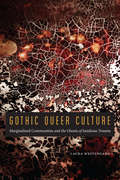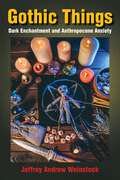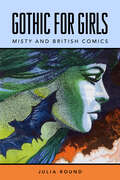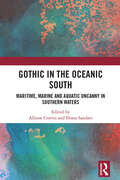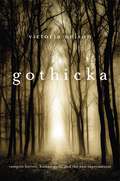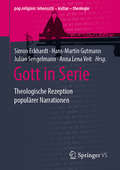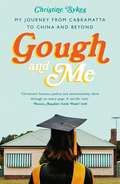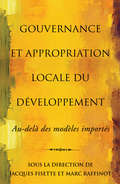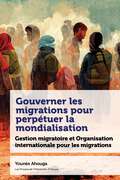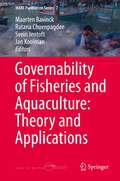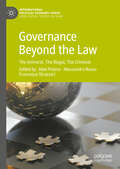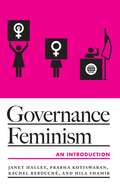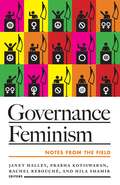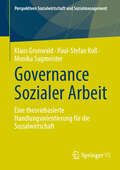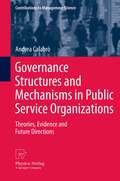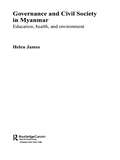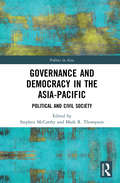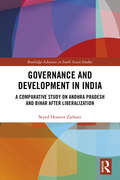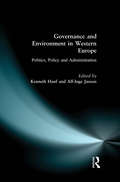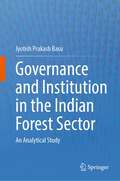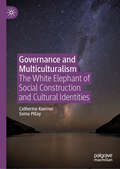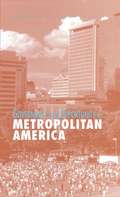- Table View
- List View
Gothic Queer Culture: Marginalized Communities and the Ghosts of Insidious Trauma (Expanding Frontiers: Interdisciplinary Approaches to Studies of Women, Gender, and Sexuality)
by Laura WestengardIn Gothic Queer Culture, Laura Westengard proposes that contemporary U.S. queer culture is gothic at its core. Using interdisciplinary cultural studies to examine the gothicism in queer art, literature, and thought—including ghosts embedded in queer theory, shadowy crypts in lesbian pulp fiction, monstrosity and cannibalism in AIDS poetry, and sadomasochism in queer performance—Westengard argues that during the twentieth and twenty-first centuries a queer culture has emerged that challenges and responds to traumatic marginalization by creating a distinctly gothic aesthetic.Gothic Queer Culture examines the material effects of marginalization, exclusion, and violence and explains why discourse around the complexities of genders and sexualities repeatedly returns to the gothic. Westengard places this queer knowledge production within a larger framework of gothic queer culture, which inherently includes theoretical texts, art, literature, performance, and popular culture. By analyzing queer knowledge production alongside other forms of queer culture, Gothic Queer Culture enters into the most current conversations on the state of gender and sexuality, especially debates surrounding negativity, anti-relationalism, assimilation, and neoliberalism. It provides a framework for understanding these debates in the context of a distinctly gothic cultural mode that acknowledges violence and insidious trauma, depathologizes the association between trauma and queerness, and offers a rich counterhegemonic cultural aesthetic through the circulation of gothic tropes.
Gothic Things: Dark Enchantment and Anthropocene Anxiety
by Jeffrey Andrew WeinstockSHORTLISTED, THE ALLAN LLOYD SMITH PRIZE FOR BEST MONOGRAPHOffering an innovative approach to the Gothic, Gothic Things: Dark Enchantment and Anthropocene Anxiety breaks ground with a new materialist analysis of the genre, highlighting the ways that, since its origins in the eighteenth century, the Gothic has been intensely focused on “ominous matter” and “thing power.” In chapters attending to gothic bodies, spaces, books, and other objects, Gothic Things argues that the Gothic has always been about what happens when objects assume mysterious animacy or potency and when human beings are reduced to the status of just one thing among many—more powerful—others.In exploring how the Gothic insistently decenters the human, Jeffrey Andrew Weinstock reveals human beings to be enmeshed in networks of human and nonhuman forces mostly outside of their control. Gothic Things thus resituates the Gothic as the uncanny doppelgänger of twenty-first-century critical and cultural theory, lurking just beneath the surface (and sometimes explicitly surfacing) as it haunts considerations of how human beings interact with objects and their environment. In these pages the Gothic offers a dark reflection of the contemporary “nonhuman turn,” expressing a twenty-first-century structure of feeling undergirded by anxiety over the fate of the human: spectrality, monstrosity, and apocalypse.Substituting horror for hope, the Gothic, Weinstock explains, has been a philosophical meditation on human relations to the nonhuman since its inception, raising significant questions about how we can counter anthropocentric thought in our quest to live more harmoniously with the world around us.
Gothic Tourism: Constructing Haunted England (Palgrave Gothic)
by Emma McEvoyFrom Strawberry Hill to The Dungeons, Alnwick Castle to Barnageddon, Gothic tourism is a fascinating, and sometimes controversial, area. This lively study considers Gothic tourism's aesthetics and origins, as well as its relationship with literature, film, folklore, heritage management, arts programming and the 'edutainment' business.
Gothic for Girls: Misty and British Comics
by Julia RoundWinner of the 2019 Broken Frontier Award for Best Book on ComicsToday fans still remember and love the British girls’ comic Misty for its bold visuals and narrative complexities. Yet its unique history has drawn little critical attention. Bridging this scholarly gap, Julia Round presents a comprehensive cultural history and detailed discussion of the comic, preserving both the inception and development of this important publication as well as its stories. Misty ran for 101 issues as a stand-alone publication between 1978 and 1980 and then four more years as part of Tammy. It was a hugely successful anthology comic containing one-shot and serialized stories of supernatural horror and fantasy aimed at girls and young women and featuring work by writers and artists who dominated British comics such as Pat Mills, Malcolm Shaw, and John Armstrong, as well as celebrated European artists. To this day, Misty remains notable for its daring and sophisticated stories, strong female characters, innovative page layouts, and big visuals.In the first book on this topic, Round closely analyzes Misty’s content, including its creation and production, its cultural and historical context, key influences, and the comic itself. Largely based on Round’s own archival research, the study also draws on interviews with many of the key creators involved in this comic, including Pat Mills, Wilf Prigmore, and its art editorial team Jack Cunningham and Ted Andrews, who have never previously spoken about their work. Richly illustrated with previously unpublished photos, scripts, and letters, this book uses Misty as a lens to explore the use of Gothic themes and symbols in girls’ comics and other media. It surveys existing work on childhood and Gothic and offers a working definition of Gothic for Girls, a subgenre which challenges and instructs readers in a number of ways.
Gothic in the Oceanic South: Maritime, Marine and Aquatic Uncanny in Southern Waters
by Diana Sandars Allison CravenThis dynamic multidisciplinary collection of essays examines the uncanny, eerie, wondrous, and dreaded dimensions of oceans, seas, waterways, and watery forms of the oceanic South, a haunted global precinct stretching across the Pacific, Southern and Indian Oceans, and around Australasia, Oceania, Aotearoa New Zealand, and South Africa. Presenting work from leading scholars, the chapters contend with the contemporary fears and repressions associated with the return of environmental traumas, colonial traumas, and the spectres of the precolonial deep past that resurface in the present. The book examines the manifestations of these Gothic aesthetics and propensities across a range of watery spaces – seas, oceans, waterholes, and swamps – in vessels, ports, shorelines, journeys, strandings, and transformations, in amphibious bodies and the drowned, all of which promote haunted engagement with the materiality of water. This collection renews the interdisciplinary breadth of Gothic criticism and the relevance of Gothic affect and sensibility to understanding the histories and cultures of the oceanic South through an exploration of the rarely considered uncanniness of the oceans, waterways, and aqueous forms of the Southern Hemisphere, haunted by colonial and precolonial imaginings of the Antipodes, the legacies of imperialism, and the “double vision” between Oceanic and settler-colonial epistemologies, and the encroaching menace of climate change. Comprising diverse contributions from screen, literary, and cultural studies, environmental humanities, human geography, and creative practice in ecological sound art, and poetry, the collection examines the uncanny and the sublime in watery fictions and authentic settings of a range of aqueous southern forms – ocean surfaces and depths, haunted shallows and reefs, moist mangroves, moss and lichen, the awesome horror of tidal apocalypse. This book will be illuminating reading for students and scholars of cultural studies, postcolonial studies, area studies, and Indigenous studies.
Gothicka
by Victoria NelsonThe Gothic, Romanticism's gritty older sibling, has flourished in myriad permutations since the eighteenth century. In Gothicka, Victoria Nelson identifies the revolutionary turn it has taken in the twenty-first. Today's Gothic has fashioned its monsters into heroes and its devils into angels. It is actively reviving supernaturalism in popular culture, not as an evil dimension divorced from ordinary human existence but as part of our daily lives. To explain this millennial shift away from the traditionally dark Protestant post-Enlightenment Gothic, Nelson studies the complex arena of contemporary Gothic subgenres that take the form of novels, films, and graphic novels. She considers the work of Dan Brown and Stephenie Meyer, graphic novelists Mike Mignola and Garth Ennis, Christian writer William P. Young (author of The Shack), and filmmaker Guillermo del Toro. She considers twentieth-century Gothic masters H. P. Lovecraft, Anne Rice, and Stephen King in light of both their immediate ancestors in the eighteenth century and the original Gothic-the late medieval period from which Horace Walpole and his successors drew their inspiration. Fictions such as the Twilight and Left Behind series do more than follow the conventions of the classic Gothic novel. They are radically reviving and reinventing the transcendental worldview that informed the West's premodern era. As Jesus becomes mortal in The Da Vinci Code and the child Ofelia becomes a goddess in Pan's Labyrinth, Nelson argues that this unprecedented mainstreaming of a spiritually driven supernaturalism is a harbinger of what a post-Christian religion in America might look like.
Gott im liberalen Christentum: Vom gnädigen Gott der Reformation zum Posttheismus des 21. Jahrhunderts
by Kurt BangertDieses Buch bietet in einer durchweg verständlichen Weise einen Gang durch 500 Jahre Theologiegeschichte, von 1520 bis 2020, mit einem besonderen Schwerpunkt auf der Wandlung der Gottesvorstellungen, die anhand der einflussreichsten Philosophen und Theologen exemplifiziert werden. Dabei werden nicht nur die historischen Kontexte der jeweiligen Protagonisten beleuchtet, sondern auch deren Biographien. Ihre theologischen Vorstellungen werden u.a. auch anhand von aussagefähigen Originalzitaten veranschaulicht. Es werden auch das Verhältnis zu anderen Religionen u. das Verhältnis zu den Naturwissenschaften beleuchtet. Das Buch endet mit einem Ausblick auf die zukünftige Theologie.Der AutorKurt Bangert war Forschungsleiter und Research Advisor am World Vision Institut für Forschung und Innovation in Friedrichsdorf. Der Theologe ist Autor zahlreicher Artikel und Bücher sowie Schriftleiter der theologischen Zeitschrift Freies Christentum.
Gott in Serie: Theologische Rezeption populärer Narrationen (pop.religion: lebensstil – kultur – theologie)
by Simon Eckhardt Hans-Martin Gutmann Julian Sengelmann Anna Lena VeitDer Sammelband beschäftigt sich mit Serien als festem Bestandteil gegenwärtiger Popkultur, die Erzählmuster bekannter Hollywoodformate ablösen. In den Großerzählungen der Serienlandschaft werden religiöse Themen explizit und implizit verhandelt und zum handlungstragenden Element.
Gough and Me: My Journey from Cabramatta to China and beyond
by Christine SykesWhen Gough Whitlam moves into her street in Cabramatta in 1957, eight-year-old Christine has little idea how her new neighbour, one of the most visionary and polarising political leaders of Australia, would shape the direction of her life. Born to working-class parents and living in a fibro house built by her truck-driver father, Christine simply dreams that one day she might work as a private secretary like her aunt. But when the reforms Whitlam championed give Christine the chance to go to university, her world expands. She experiences the transformative power of education, struggles to balance motherhood with being the family breadwinner, and faces her own mental health battles. She follows a path forged by Whitlam, from scholarships he fought for, to local community initiatives he generated, and even as far as China, where Whitlam crucially initiated Australia&’s relationship when he visited the country in 1973. Written with genuine heart and humour, Gough and Me is a nostalgic and deeply personal memoir of social mobility, cultural diversity, and the unprecedented opportunities that the Whitlam era gave one Australian working-class woman.
Gouvernance et appropriation locale du développement: Au-delà des modèles importés (Études en développement international et mondialisation)
by Fisette, Jacques; Raffinot, MarcLa gouvernance représente l'une des plus importantes innovations conceptuelles des quinze dernières années dans le discours de l'aide au développement. A-t-elle pour autant transformé les pratiques? A-t-elle conduit à une plus grande appropriation locale des enjeux du développement? Ces questions sont débattues autour de trois thèmes : les nouveaux dispositifs de lutte contre la pauvreté, le Nouveau Partenariat pour le Développement de l'Afrique (NEPAD) et enfin, la décentralisation et la gestion des services publics.
Gouverner les migrations pour perpétuer la mondialisation: Gestion migratoire et Organisation internationale pour les migrations
by Younès AhougaMigration management is a concept that proposes regulatory transparency in dealing with the realities of international migration. Migration management reduces the complexity of related regulation to make it more intelligible, to govern in a depoliticized, technocratic way, and to ensure the movement of globalization. In the absence of an international migration framework, however, migration management faces competition from the securitization and liberalization of migration. For migration management to endure, it must rely on the material application of its interpretations enabled by institutions. To understand the evolution of migration management from interpretation to application within the International Organization for Migration (IOM), this book notes three moments, its emergence, its organisation and its engagement From the early 2000s to 2018, this key institution in migration governance notably expanded its role and activities to include migration management. This book’s approach blends cultural political economy and critical discourse analysis to examine the evolution of a concept allowing for the interaction of the production of meaning, social actors' capacity for action, structuring of the institutional context, and government technologies. Based on an analysis of IOM meetings and documents, the author reveals how various international civil servants, diplomats and experts have formulated, disseminated, applied, or contested migration management. The study of this concept helps to understand IOM's transformation and its role in the constitution of a new migration governance, following the adoption of the Global Compact for Migration in 2018.
Governability of Fisheries and Aquaculture: Theory and Applications
by Jan Kooiman Svein Jentoft Ratana Chuenpagdee Maarten BavinckFollowing from Fish for Life - Interactive Governance for Fisheries (Kooiman et al., 2005), which presents an interdisciplinary and intersectoral approach to the governance of capture and aquaculture fisheries, this volume pursues what interactive governance theory and the governability perspective contribute to the resolution of key fisheries problems, these include overfishing, unemployment and poverty, food insecurity, and social injustice. Since these problems are varied and can be felt among governments, resource users and communities globally, the diagnosis must be holistic, and take account of principles, institutions, and operational conditions. The authors argue that 'wicked problems' and institutional limitations are inherent to each setting, and must be included in the analysis. The volume thereby offers a new lens and a systematic approach for analysing the nature of problems and challenges concerning the governance of fisheries, explores where these problems are situated, and how potential solutions may be found. "It now seems clear that the crisis in the world's fisheries [is] a much larger and more complex problem than many had imagined. Yet, examining it through the lens of governability may offer the best hope for alleviating it--as well as alleviating similar crises in other social systems." James R. McGoodwin (Professor Emeritus, University of Colorado)
Governable Spaces: Democratic Design for Online Life
by Nathan SchneiderA free ebook version of this title is available through Luminos, University of California Press's Open Access publishing program. Visit www.luminosoa.org to learn more. When was the last time you participated in an election for an online group chat or sat on a jury for a dispute about a controversial post? Platforms nudge users to tolerate nearly all-powerful admins, moderators, and "benevolent dictators for life." In Governable Spaces, Nathan Schneider argues that the internet has been plagued by a phenomenon he calls "implicit feudalism": a bias, both cultural and technical, for building communities as fiefdoms. The consequences of this arrangement matter far beyond online spaces themselves, as feudal defaults train us to give up on our communities' democratic potential, inclining us to be more tolerant of autocratic tech CEOs and authoritarian tendencies among politicians. But online spaces could be sites of a creative, radical, and democratic renaissance. Using media archaeology, political theory, and participant observation, Schneider shows how the internet can learn from governance legacies of the past to become a more democratic medium, responsive and inventive unlike anything that has come before.
Governance Beyond the Law: The Immoral, The Illegal, The Criminal (International Political Economy Series)
by Abel Polese Alessandra Russo Francesco StrazzariThis volume explores the continuous line from informal and unrecorded practices all the way up to illegal and criminal practices, performed and reproduced by both individuals and organisations. The authors classify them as alternative, subversive forms of governance performed by marginal (and often invisible) peripheral actors. The volume studies how the informal and the extra-legal unfold transnationally and, in particular, how and why they have been/are being progressively criminalized and integrated into the construction of global and local dangerhoods; how the above-mentioned phenomena are embedded into a post-liberal security order; and whether they shape new states of exception and generate moral panic whose ultimate function is regulatory, disciplinary and one of crafting practices of political ordering.
Governance Feminism: An Introduction
by Janet Halley Prabha Kotiswaran Rachel Rebouché Hila ShamirDescribing and assessing feminist inroads into the state Feminists walk the halls of power. Governance Feminism: An Introduction shows how some feminists and feminist ideas—but by no means all—have entered into state and state-like power in recent years. Being a feminist can qualify you for a job in the United Nations, the World Bank, the International Criminal Court, the local prosecutor&’s office, or the child welfare bureaucracy. Feminists have built institutions and participate in governance.The authors argue that governance feminism is institutionally diverse and globally distributed. It emerges from grassroots activism as well as statutes and treaties, as crime control and as immanent bureaucracy. Conflicts among feminists—global North and South; left, center, and right—emerge as struggles over governance. This volume collects examples from the United States, Israel, India, and from transnational human rights law.Governance feminism poses new challenges for feminists: How shall we assess our successes and failures? What responsibility do we shoulder for the outcomes of our work? For the compromises and strange bedfellows we took on along the way? Can feminism foster a critique of its own successes? This volume offers a pathway to critical engagement with these pressing and significant questions.
Governance Feminism: Notes from the Field
by Janet Halley Prabha Kotiswaran Rachel Rebouché Hila ShamirAn interdisciplinary, multifaceted look at feminist engagements with governance across the global North and global SouthGovernance Feminism: Notes from the Field brings together nineteen chapters from leading feminist scholars and activists to critically describe and assess contemporary feminist engagements with state and state-like power. Gathering examples from North America, South America, Europe, Asia, and the Middle East, it complements and expands on the companion volume Governance Feminism: An Introduction. Its chapters argue that governance feminism (GF) is institutionally diverse and globally distributed—emerging from traditional sites of state power as well as from various forms of governance and operating at the grassroots level, in the private sector, in civil society, and in international relations. The book begins by confronting the key role that crime and punishment play in GFeminist projects. Here, contributors explore the ideological and political conditions under which this branch of GF became so robust and rethink the carceral turn. Other chapters speak to another face of GFeminism: feminists finding, in mundane and seemingly unspectacular bureaucratic tools, leverage to bring about change in policy and governance practices. Several contributions highlight the political, strategic, and ethical challenges that feminists and LGBT activists must negotiate to play on the governmental field. The book concludes with a focus on feminist interventions in postcolonial legal and political orders, looking at new policy spaces opened up by conflict, postconflict, and occupation.Providing a clear, cross-cutting, critical lens through which to map developments in feminist governance around the world, Governance Feminism: Notes from the Field makes sense of the costs and benefits of current feminist realities to reimagine feminist futures. Contributors: Libby Adler, Northeastern U; Aziza Ahmed, Northeastern U; Elizabeth Bernstein, Barnard College; Amy J. Cohen, Ohio State U; Karen Engle, U of Texas at Austin; Jacob Gersen, Harvard U; Leigh Goodmark, U of Maryland; Aeyal Gross, Tel Aviv U; Aya Gruber, U of Colorado, Boulder; Janet Halley, Harvard U; Rema Hammami, Birzeit U, Palestine; Vanja Hamzić, U of London; Isabel Cristina Jaramillo-Sierra; Prabha Kotiswaran, King&’s College London; Maleiha Malik, King&’s College London; Vasuki Nesiah, New York U; Dianne Otto, Melbourne Law School; Helen Reece; Darren Rosenblum, Pace U; Jeannie Suk Gersen, Harvard U; Mariana Valverde, U of Toronto.
Governance Sozialer Arbeit: Eine theoriebasierte Handlungsorientierung für die Sozialwirtschaft (Perspektiven Sozialwirtschaft und Sozialmanagement)
by Klaus Grunwald Monika Sagmeister Paul-Stefan RoßDer vorliegende Band widmet sich der Steuerung von sozialwirtschaftlichen Organisationen und von Unterstützungsarrangements der Sozialen Arbeit. Der Governance-Ansatz wird genutzt, um auf zentrale Steuerungsfragen Sozialer Arbeit konzeptionelle Antworten zu finden, die vor dem Hintergrund der gegenwärtigen gesellschaftlichen Transformationsprozesse tragfähig sind. Dazu greift er auf die Diskurse zu Welfaremix, Netzwerken sowie Organisationen und ihrer Steuerung zurück. Ziel ist eine theoretisch-konzeptionelle Fundierung der Handlungspraxis von (potenziellen) Führungskräften in der Sozialen Arbeit.
Governance Structures and Mechanisms in Public Service Organizations: Theories, Evidence and Future Directions
by Andrea CalabròThis book addresses the nexus of issues exploring governance structures and mechanisms in public service organizations, thus contributing to the development of disciplines that focus on public management. It goes beyond the state of the art by addressing a number of specific issues in a more systematic fashion. The book's interdisciplinary focus is a particularly valuable asset, as its topic is situated at the crossroads of a number of fields, including public management, business administration, corporate governance, policy studies, political science, sociology, and third sector studies, all of which offer important perspectives and are important for the development of public management and public services. The book covers more than Italy and Norway and focuses specifically on public service organizations, addressing more aspects of their governance structures and mechanisms than any other book available today. The unique presentation of features related to the governance and management of different actors (state-owned enterprises, local public utilities, ministries, municipalities, citizens, etc.), involved at different levels in the production and provision of public services, makes it possible to compare and contrast these different perspectives and opens new avenues of theoretical collaboration and development.
Governance and Civil Society in Myanmar: Education, Health and Environment (Routledge Contemporary Southeast Asia Series #Vol. 3)
by Helen JamesMost international attention on Myanmar has focused on the political situation, where the military, in power since 1962, continues to refuse to acknowledge the results of democratic elections, and on related human rights issues. This book, by focusing on education, health and environment, and on the institutions which formulate and deliver policy in these fields, shows how the international community can make a significant difference to strengthening Myanmar's civil society and to supporting a future democratic form of government, by encouraging institutional developments in these fields. Such developments in turn, the author argues, will re-skill the younger generation, promote economic development and poverty alleviation, and, through a participatory approach to policy-making, nurture the conditions from which democracy will grow.
Governance and Democracy in the Asia-Pacific: Political and Civil Society (Politics in Asia)
by Mark R. Thompson Stephen McCarthyThis book explores the theoretical and empirical relationship between democracy and governance in the Asia-Pacific region. Examining a variety of country cases and themes addressing the theoretical tension between governance and democracy, it illuminates how this impacts political and civil societies across the region. Analysing the character, structure and current trajectories of polities in the Asia-Pacific, democratic or otherwise, this book demonstrates that the role of civil society, political society and governance has significantly differed in practice from what has been commonly assumed within the international community. The book includes both theoretical investigations tracing the modern development of the concepts of governance, development and democratization as well as regional and country-specific observations of major issues, presenting comprehensive country-level studies of China, Singapore, Thailand, Cambodia, the Philippines, Myanmar, Fiji and the Solomon Islands. Presenting fascinating insight into non-democratic governance, civil society and the rule of law in illiberal contexts, Governance and Democracy in the Asia-Pacific will prove to be of great use to students and scholars of Asian politics and society, as well as international and comparative politics.
Governance and Development in India: A Comparative Study on Andhra Pradesh and Bihar after Liberalization (Routledge Advances in South Asian Studies)
by Seyed Hossein ZarhaniThe study of the political economy of development in India is significant as India has emerged as one of the fastest-growing countries during the last three decades and the rate of economic growth and poverty reduction have not been matched in India’s subnational states. Although the Union Government has introduced and implemented several economic reforms since 1991 to enhance the economic development, the results of implantation have varied. Governance and Development in India compares two Indian subnational states, Andhra Pradesh and Bihar. The book does not consider the state as an aggregate entity; rather, it disaggregates the state relationally and spatially. Concentrating on the micro-institutional variables and the role of regional elites, the author investigates the political roots of the divergence of development trajectories among India’s subnational states since liberalization, as an essential aspect of the political economy of development in India. The book explores the black box of the multi-layered state of India and interactions among the Central Government, the states, regional leaders and other stakeholders and explains why the regional leaders have pursued divergent economic strategies using the analytical narrative research method and the subnational comparative research method. Firmly based on the theoretical foundations of the neo-institutional rational choice model of governance, polycentric hierarchy theory and the strategies for regional elite strategy analysis, combined with empirical research, this book is a valuable contribution to the fields of comparative political economy, state politics in India, governance and development in developing countries, and South Asian comparative politics.
Governance and Environment in Western Europe: Politics, Policy and Administration
by Kenneth Hanf Alf-Inge JansenGovernance and Environment in Western Europe: Politics, Policy and Administration, provides an up-to-date overview of developments in this area focusing on a selection of ten countries in Western Europe and the European Union. The countries examined are: Denmark, France, Germany, Greece, Italy, The Netherlands, Norway, Spain, Sweden and the United Kingdom. The range of countries covered - representing as they do different stages of development in environmental policy, different state and institutional traditions - provides an interesting comparative analysis of how different countries confronting similar problems of environmental management have responded politically and (re)organised their administrative systems for implementing these policies.
Governance and Institution in the Indian Forest Sector: An Analytical Study
by Jyotish Prakash BasuThis book addresses quantitative assessment of forest governance and how local-level institutions work in governing efficient ways of forest resource management so that sustainable development of forest is ensured. The research is done at the micro-level as well as macro-level in India. The research presented here focuses on forest governance and institutions in the two forest divisions of West Bengal say South Bengal and North Bengal. The research covers 36 villages, 844 households, 10 Gram panchayat, 12 Beat offices, and 36 Forest protection Committees in West Bengal and also studies different local-level institutions like local communities/households; Joint Forest Management Committees (JFMC)/Forest Protection Committees (FPCs); Community Forest Management groups; Van Panchayats; Village Councils (schedule VI area) and Biodiversity Management Committees; Eco-development committees, NGOs and Self-Help Groups, and Panchayati Raj Institutions (PRIs). Chapters also address various issues like monitoring, enforcement, rule of law, transparency, accountability, participation, control of corruption, government effectiveness, regulatory quality, and sustainable livelihood in connection with the study of forest governance. This research is associated with different sectors like agricultural sector, forestry sector, informal sectors and rural development, etc., and involved multi-stakeholders. Particular attention is given on the policy-oriented research which is the cornerstone of SDG of 16. Developmental practitioners, government implementation agencies, researchers in environmental science and social science, and policymakers find this book appealing.
Governance and Multiculturalism: The White Elephant of Social Construction and Cultural Identities
by Soma Pillay Catherine KoernerA key intervention in the growing critical literature on race, this volume examines the social construction of race in contemporary Australia through the lenses of Indigenous sovereignty, nationhood, and whiteness. Informed by insights from white Australians in rural contexts, Koerner and Pillay attempt to answer how race shapes those who identify as white Australian; how those who self-identify thusly relate to the nation, multiculturalism, and Indigenous Sovereignties; and how white Australians understand and experience their own racialized position and its privilege. This “insider perspective” on the continuing construction of whiteness in Australia is analyzed and challenged through Indigenous Sovereign theoretical standpoints and voices. Ultimately, this investigation of the social construction of race not only extends conceptualizations of multiculturalism, but also informs governance policy in the light of changing national identity.
Governance and Opportunity in Metropolitan America
by National Research CouncilAmerica's cities have symbolized the nation's prosperity, dynamism, and innovation. Even with the trend toward suburbanization, many central cities attract substantial new investment and employment. Within this profile of health, however, many urban areas are beset by problems of economic disparity, physical deterioration, and social distress.This volume addresses the condition of the city from the perspective of the larger metropolitan region. It offers important, thought-provoking perspectives on the structure of metropolitan-level decisionmaking, the disadvantages faced by cities and city residents, and expanding economic opportunity to all residents in a metropolitan area. The book provides data, real-world examples, and analyses in key areas: Distribution of metropolitan populations and what this means for city dwellers, suburbanites, whites, and minorities.How quality of life depends on the spatial structure of a community and how problems are based on inequalities in spatialopportunity--with a focus on the relationship between taxes and services.The role of the central city today, the rationale for revitalizing central cities, and city-suburban interdependence. The book includes papers that provide in-depth examinations of zoning policy in relation to patterns of suburban development; regionalism in transportation and air quality; the geography of economic and social opportunity; social stratification in metropolitan areas; and fiscal and service disparities within metropolitan areas.
